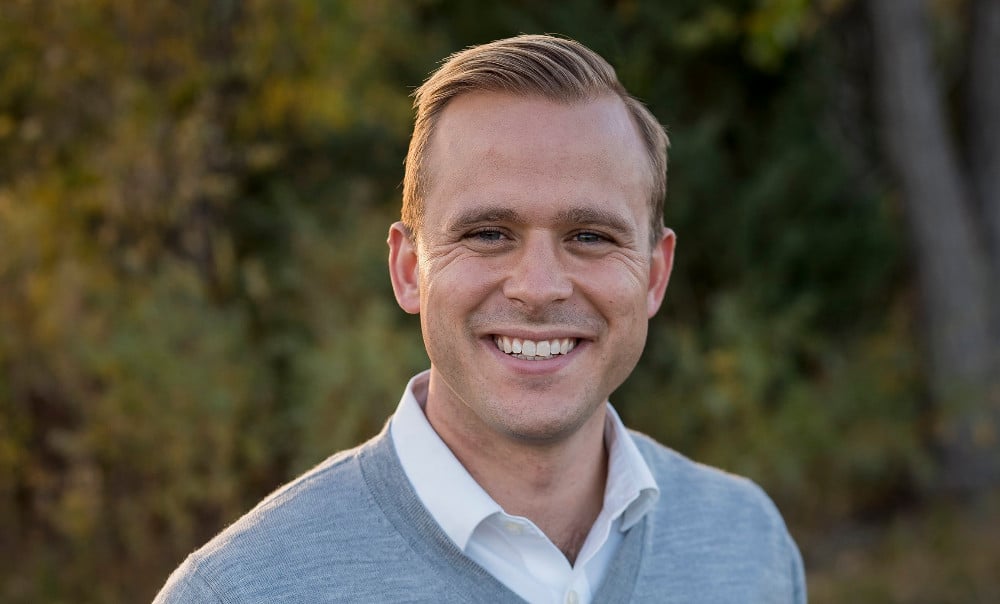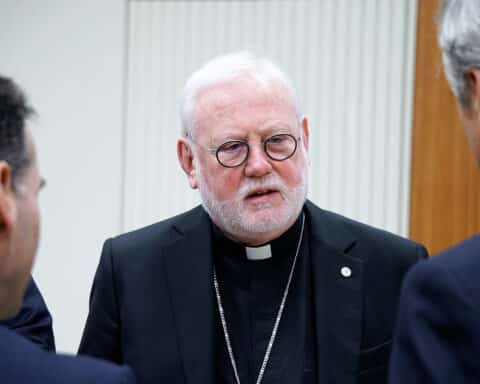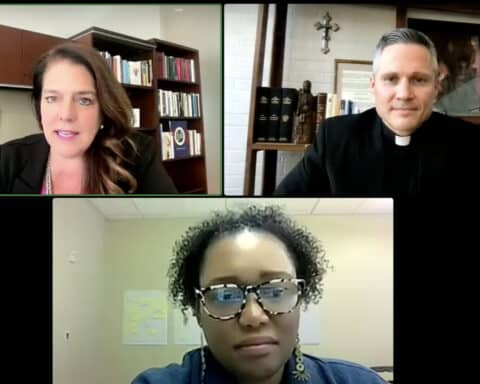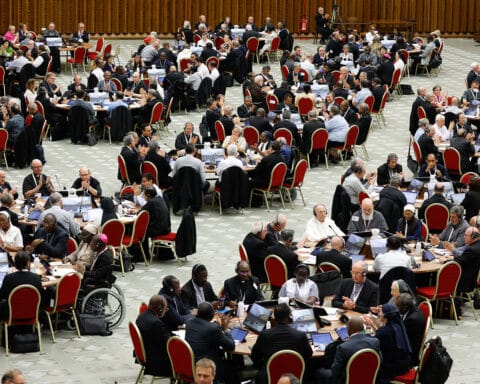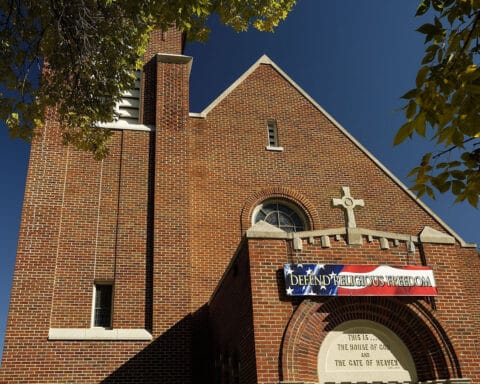On April 4, Bishop Andrew H. Cozzens of the Diocese of Crookston, Minnesota, chairman of the U.S. Conference of Catholic Bishops’ Committee on Evangelization and Catechesis, announced that Tim Glemkowski had been chosen as the executive director of the National Eucharistic Congress — a five-day event scheduled to take place July 17-21, 2024, in Indianapolis, and a key event to which the National Eucharistic Revival is building up.
Two years ahead of the Congress, in an email interview with Our Sunday Visitor, Glemkowski, 33, who lives with his wife and three young children near Denver, said the event is meant to be a moment that will bring people to a Eucharistic movement, something that is necessary for the new apostolic age.
Our Sunday Visitor: You identify yourself as a Catholic evangelist. What does that mean to you, as a profession and vocation?
Tim Glemkowski: The Greek word evangelion, which serves as the root of evangelist or evangelization, means “Good News.”
Each of us has a unique calling on our life, some definite service that God has created us for, as St. John Henry Newman said. In my life and ministry, I have felt called to proposing the fundamental Gospel message, the Good News of the story of what God the Father has done for us in Christ Jesus, and the difference that makes in our lives. As I have prayed through why I felt called to this, I think it comes fundamentally from recognizing two things:
1.) We live in apostolic times. Christendom is over. We as a Church have to become adept at proposing and not presupposing the Faith. This requires, more than just tweaks to our tactics, a complete change of culture. I’m a millennial, so I feel like I sort of never knew Christendom. I always grew up in a time when it was dramatically countercultural to live the faith. So this has always seemed sort of self-evident to me.
2.) The most important thing we can do in order to begin this transformation of culture is to come back to our “why.” I was a kid who, growing up, asked “Why?” a lot. For us, as a Church, that why is the story of a God who created us out of love and, when we were brought captive into sin and death, moved mountains to bring us home through the death and resurrection of his son. Jesus, sent by the Father to accomplish that reconciling mission, sent his Church to do the same. This is why Pope Paul VI says in Evangelii Nuntiandi (On the Evangelization of the Modern World), “The Church exists in order to evangelize.” It is this mission, given first to the Son who invites his bride, the Church, into that mission with him, which is why every smell, bell, rosary, statue, doctrine, moral discipline, that we have as a Catholic Church, exists.
So, in light of that mission, I’m not sure we as a Church are often really as faithfully focused on it as we need to be, especially given the apostolic moment in which we live. I think for a long time, we had stable communities of the faithful who erected churches and faithfully showed up to them, for Sunday Mass, for school, for community life, etc. There is a great advantage to that, but we can also become comfortable and forget our identity. The renewal or revival I would like to see in the Church is one that sees us even more equipped to help people encounter the “life to the full” (Jn 10:10) that Jesus came to bring.
I feel called to play whatever small part I can in that “missionary moment” of the Church. To me, “Catholic speaker” or “Catholic consultant” or “nonprofit founder” never really seemed to capture the heart of it the same way “Good News Teller” or “evangelist” did.
Our Sunday Visitor: What does that mean in relation to the way we Catholics are all called to be evangelists?
Glemkowski: I think all of us today are supposed to be evangelists, in some way. Part of the compelling witness we are being asked to give is to contextualize our own life’s story in light of the one big story of what God has done in creating and redeeming us, and then be able to live abundantly from that worldview. Even further, we should then be able to unpack that story for others in a way they can come to recognize God’s action in reality. We call that our “testimony.”
Our Sunday Visitor: How did your background lead to your becoming the executive director of the National Eucharistic Congress?
Glemkowski: I was just asking God this question the other day!
I think he prepared me practically and professionally in two ways. First, I have a lot of experiences with start-up apostolates, which the National Eucharistic Congress Inc. is. In addition to carrying out a few big initiatives related to the three-year Eucharistic Revival, the organization will continue in order to perpetuate the work of Eucharistic Revival in the Church.
I founded an apostolate, L’Alto Catholic Institute, in 2016, that worked with parishes and dioceses to create a culture of evangelization and discipleship. Additionally, I had worked with the Augustine Institute and Amazing Parish to launch a platform known as Revive Parishes that helped train leaders for parish renewal. Both were complex initiatives that required me to wear many hats, which this role will, as well!
Second, I most recently served as the director of strategy for the Archdiocese of Denver, facilitating Archbishop [Samuel] Aquila’s strategic leadership team and project-managing key initiatives related to his vision of an archdiocesan move to mission. I got a real sense for how the Church works from that job. During that time, I came on board the [U.S. Conference of Catholic Bishops] Committee for Evangelization and Catechesis as one of six lay consultants, which exposed me from the earliest days to this remarkable project and allowed me to be part of the strategic planning. I believe that 18 months of work for and growing familiarity with the revival gave our board a chance to grow in confidence that I could handle what this role will require!
I think much of God’s preparation has been interior, though. I had confidence taking on this role because I know God has led me and my family through incredible joys and significant challenges and has never let us down. As I prayed about this question the other day, I recognized that God has prepared me mainly in hidden ways, where he has allowed me to wrestle with him and slowly has changed my heart to, hopefully, be more open to his working. Leadership in the Church, ultimately, is all about that. Can we allow God to move? Can we get out of the way enough that our work ultimately isn’t just about our hopes and dreams but his? Or, better said, that those two wills become more aligned.
Our Sunday Visitor: How is the Eucharistic Congress organized, and why is it that way? My understanding is that this year is focused on dioceses, next year is parishes and smaller communities, and the final year is the national Congress, so we’re going, essentially, medium-small-large, instead of a progression from small-medium-large. Why?
Glemkowski: We call the three-year initiative the “National Eucharistic Revival,” and then the congress will be a key milestone moment of that grassroots movement, at the beginning of the third year, the “Year of Missionary Sending.”
Why now? The basic logic of the revival is this: It is clear that the world is wounded, and the Church is God’s plan for bringing healing. In her life, teaching, and worship, the Church is God’s antidote to the brokenness of the world. But, in order to effectively carry out that mission, especially now, the Church herself needs healing.
Essentially, the goal of the first two years is revival and renewal ad intra. We as Catholics and as a Church need to be “healed, formed, converted and unified” in order to present a compelling witness to the world. This two-year pilgrimage will lead toward the congress in 2024 in Indianapolis and then, from the congress, the entire Church will be sent to the margins “for the life of the world” (Jn 6:51).
The congress is the hinge point of the whole three-year initiative.
Having the diocesan year come before the parish year makes sense when you think about the goals of the diocesan year. One of the goals of the diocesan year is focusing on leadership, both for personal renewal and then for preparation/formation for the parish year. This year will be a chance for all leaders to receive first, before being asked to give. I think this is an essential first step; God always wants to love each of us and desires relationship first, more than just what he can do with us.
Our Sunday Visitor: What are your hopes for the Eucharistic Congress? For individual Catholics and for the Church in the United States? Is it a matter of a new (or renewed) understanding of Eucharist, or a matter of actions to be taken and/or behavior to be changed?
Glemkowski: Ultimately, a belief that does not change how we live matters very little. “Even the demons believe and tremble” (Jas 2:19). Belief is critical, and our faith is inherently a faith of the mind. God wants to engage our intellects and help us to understand what it is that we profess and celebrate. But that is a starting point, not the ending.
When Jesus encountered or healed people in the Gospels, they were asked to live differently. The congress won’t be just about head knowledge but heart transformation. We want people to encounter God in the Eucharist, in the midst of his Church, in a way that transforms them and becomes a catalyst for transformation and ongoing revival for decades to come.
I went back recently and read all of the old articles in the Denver Catholic Register about World Youth Day in 1993. To live in Denver and be Catholic is to know that we are still benefitting from the effects of those days with the Pope St. John Paul II. Countless apostolates, vocations, conversions came from that experience. As I read these old articles, I became convicted that God was going to do something similar in Indianapolis in 2024.
I think that some people are concerned that this congress will be “just an event.” People forget that Pentecost was an “event.” The feeding of the 5,000 was an “event.” Events don’t necessarily have to be something that don’t make an impact going forward. It is all about how you position the gathering or event in the lead-up and in the follow-up, so that it bears fruit that will last.
We are going to be remarkably intentional in everything we do so that our five days in Indianapolis are transformative for those in attendance and for the Church in the U.S. for years to come. Even more, I hope that so many Catholics gathering together around our love for Jesus in the Eucharist is a profound witness to the broader public about what we believe and even an example to other local churches around the world. Then, we want everyone to be sent from that event as Eucharistic missionaries who go to the margins in a variety of ways.
Our Sunday Visitor: How has this experience changed you so far? How do you think it might change you going forward?
Glemkowski: Someone asked me the other day, “How do you know this Eucharistic Revival is going to work?”
I answered, “Because it has already been starting in me.”
I don’t know how to explain it, exactly, but since taking on this role, it is like God is bringing about revival in my life first. I hesitate to admit this publicly, but I haven’t received the Eucharist since accepting this role without crying. It is like he wants me, Tim, first, to be “healed, converted, formed and unified” by an encounter with him in the Eucharist before being “sent” to this position. It is difficult to describe, but I am watching it happen in my life and in the life of my family. I have hungered for prayer and for peace, for justice, for all of the fruits of the Spirit, in a way that has been surprising and notable.
Michelle Martin writes from Illinois.

